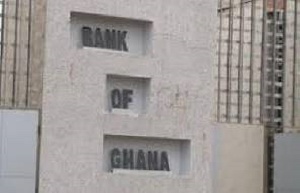The Bank of Ghana (BoG) has, for the third conservative time, reduced the policy rate by 100 basis point after its Monetary Policy Committee (MPC) meeting on Monday.
The Monetary Policy Rate (MPR) is a monetary policy tool of the BoG and it is the rate at which commercial banks can borrow from the central bank.
It communicates the monetary policy stance of government, influence money supply and also guide market interest rates.
According the BoG, given that the downside risks to growth outweigh the upside risks to inflation in the outlook, it was prudent to reduce the policy rate.
Addressing the media in Accra, Dr. Ernest Addison, said committee noted that the pace of economic activity has picked up, driven mainly by growth in private sector credit, improved business sentiments and easing credit stance.
“On inflation, the Committee noted that headline inflation, and inflation expectations have broadly trended downwards. The disinflation process has been supported by tight policy stance and exchange rate stability.
With a stable outlook for exchange rate movements and return to the path of fiscal consolidation, headline inflation is expected to trend towards the medium-term target in 2018, barring any unanticipated shocks,” he said.
Prior to the announcement today, there have been mixed reactions on whether or not the rate should be maintained or reduced.
GN Research, a research firm, had said it expected the BoG to keep the Monetary Policy Rate at 23.5 percent due to a positive trend in inflation outlook, a stable currency, an improved investor confidence and the general positive outlook for the economy.
According to GN Research, many things have happened on both the domestic and the global fronts since the last MPC meeting in March.
“At the global level, commodity prices have decreased with the prices of the country’s major exports cocoa and gold falling by almost US$200 and US$28 respectively.
However, the economic outlook for emerging economies remains positive with countries such as China and Brazil on a path of better economic recovery. Also, the uncertainty surrounding the UK’s exit negotiation from the European Union with European leaders must be a cause of worry for developing countries including Ghana,” the research firm postulated.
Meanwhile, Economist Prof. Godfred Bokpin, ahead of the announcement, called for a further drop in the policy rate.
According to him, the reduction in interest payments due to the debt restructuring, should prompt a further drop in the policy rate while restructuring of the energy sector debts was expected to lead to increased supply of cash to the banks for onward lending to businesses.
Other economists had argued that the gap between the policy rate and inflation was too wide, hence a significant reduction in the policy rate was expected.
Data from the Ghana Statistical Services (GSS) indicate that, the year-on-year inflation rate went up slightly in April to 13.0 per cent, up by 0.2 percentage points, compared with the 12.8 per cent recorded in March.
The Acting Government Statistician, Mr Baah Wadieh during a press briefing said that the monthly change rate in April 2017 was 1.6 per cent, while that for March 2017 stood at 1.3 per cent.
The year-on-year non-food inflation rate recorded for April was 16.3 per cent compared with the 15.6 per cent recorded in March 2017.
The non-food inflation rate was more than two times that of the food inflation rate of 6.7 per cent compared with 7.3 per cent recorded in March 2017.
The main “price drivers” for the non-food inflation rate were transport 24.9 per cent, recreation and culture 22.3 per cent, furnishings, household equipment and routine maintenance 21.9 per cent, miscellaneous goods and services 16.8 per cent and clothing and footwear 16.7 per cent.
Business News of Monday, 22 May 2017
Source: thebftonline.com

















